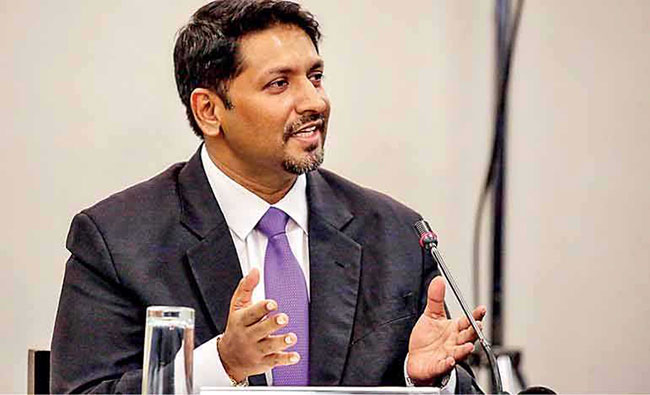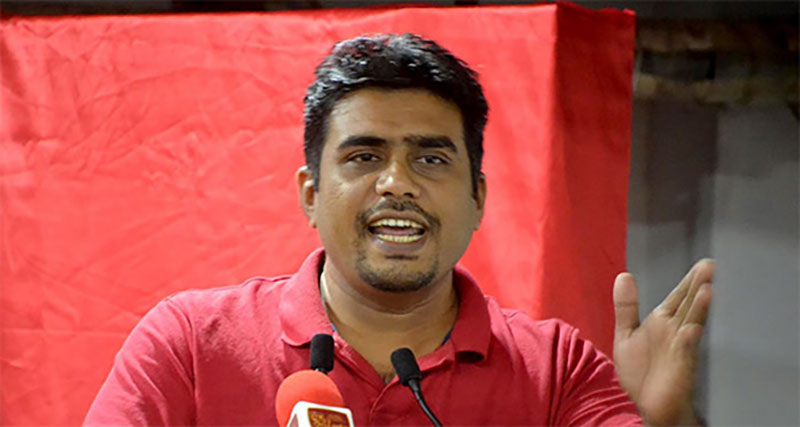News
UNP Deputy Leader blames govt. bungling for youth reluctance to take jab

The Sri Lankan youth were reluctant to get vaccinated against COVID-19 because the government had bungled the process of administering them, says UNP Deputy Leader Ruwan Wijewardene.
Speaking to UNP youth activists via zoom on Tuesday (28), former State Defence Minister Wijewardene said that less than 40 percent of youth between 20 and 29 years of age had obtained at least a single dose of the anti-Covid vaccine.
“They delay getting the vaccines because the government has not provided them with the vaccines that they prefer. For example, university students have been asked to visit the Army Hospital in Colombo to receive Moderna vaccine. When they went there they found that instead of Moderna the troops were ready to administer a Chinese vaccine. So they turned back rejecting the Chinese vaccine,” Wijewardene said.
Instead of blaming the youth, the government should understand their concerns. “Some youth are under the impression that the vaccine and its effects are for life time. So, they prefer Moderna and Pfizer saying that the European countries would give visas only to those who have obtained those brands of vaccine. A large number of youth are planning to go abroad and their concerns are reasonable. They think that obtaining another brand, including those produced in China, would deprive them of their chance to leave the country for higher education or job opportunities. The problem is becoming worse because a large number of youth are refusing to get the vaccine. Their demand is that they should receive the vaccine of their choice,” Wijewardene said.
The UNP Deputy Leader said that there was no other government in the entire history that had let the youth down so much. “Youth have become so frustrated. They are frustrated because they cannot see any progressive future for them in this country. The government is in a forex crisis and has started selling off national assets to collect dollars. There are shortages of milk-powder, gas, rice and sugar. Rice millers are planning to give up their trade. Schools and universities are shut down. In the face of this crisis, could anyone expect youth to decide to stay in this country for the rest of their lives? Hundreds of thousands of youth are planning to leave the country after the government reopens it. Many would go through legal routes while others will chose any method feasible for them,” Wijewardene said.
News
PM strengthens vocational education and economic ties with Germany

Prime Minister Dr. Harini Amarasuriya visited Hamburg, Germany, focusing on strengthening vocational education and economic partnerships between the two nations. During her visit, she participated in the 102nd East Asia Friendship Dinner, met with German President Frank-Walter Steinmeier, and engaged in high-level discussions on investment, education, and economic reforms.
As a Guest of Honour at the German Asia-Pacific Business Association (OAV) annual gathering, Prime Minister Amarasuriya addressed an audience of business leaders and dignitaries, emphasizing Sri Lanka’s economic recovery and its potential as a growing investment destination. She highlighted the contributions of over 160 German companies in Sri Lanka and invited further collaboration in trade and business.
In her capacity as the Minister of Education, Higher Education, and Vocational Education, the Prime Minister delivered a keynote speech at the ’German-Asian Forum on Vocational Education & Training.’ She acknowledged Germany’s decades-long support in Sri Lanka’s vocational education sector and stressed the importance of modernizing vocational training to align with industry demands. Additionally, she visited ITECH vocational school and German research hubs such as NXP Semiconductors and DESY, discussing collaboration in IT and technology-driven industries.
During her discussions with President Steinmeier, Prime Minister Amarasuriya reiterated Sri Lanka’s commitment to economic stability, social protection, and national unity. She also attended a business roundtable, where she engaged with German companies and government representatives on economic expansion, digitalization, and sustainable development initiatives.
The Prime Minister was accompanied by Sri Lanka’s Ambassador to Germany, Varuni Muthukumarana, and senior embassy officials.
[Prime Minister’s Media Division]
News
IGP under pressure to probe latest custodial death

Attorney-at-Law Senaka Perera on behalf of the Committee for Protecting Rights of Prisoners (Guarantee) Limited has asked Acting IGP Priyantha Weerasooriya to inquire into the death of Sathsara Nimesh soon after he was admitted to the Mulleriyawa mental hospital by Welikada police on the night of April 1.
In a letter dated April 3 addressed to the IGP, the lawyer said that the victim’s mother Lekamwasam Liyanage Samanthi, who visited Welikada police station the following day, thad been old that her son made a bid to commit suicide at the police station. Quoting the victim’s mother the lawyer said that the clothes worn by Nimesh at the time he was taken into custody by Welikada police were found within the premises.
Responding to queries, the human rights activist said that Nimesh had been caught by a group of people at Nawala road, Welikada around 7.30 pm-8 pm on April 1. Alleging that Nimesh who had been undergoing training at a private hospital as a caregiver was acting suspiciously, the group called in the police on 119 emergency line and handed him over to the police, Perera said, urging the IGP to ensure that the police followed laid out procedures when dealing with suspects.
The Attorney-at-law said that the victim’s mother had visited Mulleriyawa hospital and was able to speak with a doctor who had been present at the time Nimesh was brought there. The doctor had told her that her son was barely alive at the time he was brought in. Perera alleged that Welikada police made an attempt to allude that Nimesh was mentally unsound. If the police had been genuinely concerned about Nimesh in case he was experiencing sudden difficulty, they should have rushed him to the National Hospital, Perera said.
Acknowledging the need to deal firmly with those who are on the wrong side of the law, the rights group said that the police couldn’t adopt Gestapo-style strategies.
The National People’s Power (NPP) government couldn’t turn a blind eye to what was going on regardless of the change of government in last Sept. There had been at least two recent deaths in police custody, Perera said, referring to an incident in the Kotahena police area in the third week of February this year.
Police shot dead two persons arrested over the killing of Shashi Kumar in a mobile phone shop at Kotahena. Police claimed that law enforcement men had to open fire when the suspects made an attempt to grab a weapon from an officer while being taken to a hideout to recover hidden guns.
Lawyer Perera said that police should be ashamed to repeat a blatant lie often used by them though they knew no one accepted that.
Political parties represented in parliament should take up this matter vigorously, he said, urging the government to put an end to custodial deaths, he said. The lawyer pointed out that the Supreme Court, too, has intervened in the matter and the issue was taken up at the highest level.
By Shamindra Ferdinando
News
FSP calls proposed defence pact with India betrayal

The Frontline Socialist Party (FSP) says that if JVP’s pioneer leader Rohana Wijeweera had been alive today, he, too, would have joined the FSP in opposing the proposed defence agreement between Sri Lanka and India, calling it a serious betrayal of the nation’s interests.
Duminda Nagamuwa, Propaganda Secretary of the FSP, told the media that the JVP-led NPP government was reportedly planning to sign the agreement.Speaking to the media, Nagamuwa said there was lack of transparency surrounding the proposed accord, which had already drawn the attention of Indian experts.
“These experts have termed the agreement as the most significant between the two countries since the Indo-Lanka Peace Accord of 1987, Nagamuwa said.
“Cabinet Spokesman Minister Nalinda Jayatissa recently revealed that a number of agreements involving defence, energy, health, and digitalisation are set to be signed during Indian Prime Minister Narendra Modi’s upcoming visit to Sri Lanka. Foreign Minister Wijitha Herath had previously stated that agreements would be signed covering six key areas, but details of these agreements have not been disclosed to the public,” Nagamuwa said.
“We call upon the people of this country to realise the dangers lurking in these agreements. If the government keeps the people in the dark about their contents, they will be illegitimate.”
He said those agreements had not been presented to Parliament for approval. That marked a troubling continuation of a trend where previous agreements have been signed without proper public discourse or parliamentary scrutiny, he said.
Nagamuwa said that the Memorandum of Understanding (MoU) for the proposed accord had been signed by former President Ranil Wickremesinghe in 2023, and that the JVP/NPP was now proposing the same deal. “If Ranil Wickremesinghe had tried to sign this accord, the people would have taken to the streets in protest. But now, this government is pushing the same agreement forward,” he said.
Nagamuwa appealed to the public to closely observe the processes leading up to the signing of the accord. “We believe that this agreement will have serious implications for the country’s national security. If Comrade Wijeweera were alive today, he too would stand with us in opposing this government’s betrayal of our national interests,” he said.
-

 Sports5 days ago
Sports5 days agoSri Lanka’s eternal search for the elusive all-rounder
-

 News4 days ago
News4 days agoBid to include genocide allegation against Sri Lanka in Canada’s school curriculum thwarted
-

 News6 days ago
News6 days agoGnanasara Thera urged to reveal masterminds behind Easter Sunday terror attacks
-

 Sports1 day ago
Sports1 day agoTo play or not to play is Richmond’s decision
-

 News5 days ago
News5 days agoComBank crowned Global Finance Best SME Bank in Sri Lanka for 3rd successive year
-

 Features5 days ago
Features5 days agoSanctions by The Unpunished
-

 Features5 days ago
Features5 days agoMore parliamentary giants I was privileged to know
-

 Latest News3 days ago
Latest News3 days agoIPL 2025: Rookies Ashwani and Rickelton lead Mumbai Indians to first win










